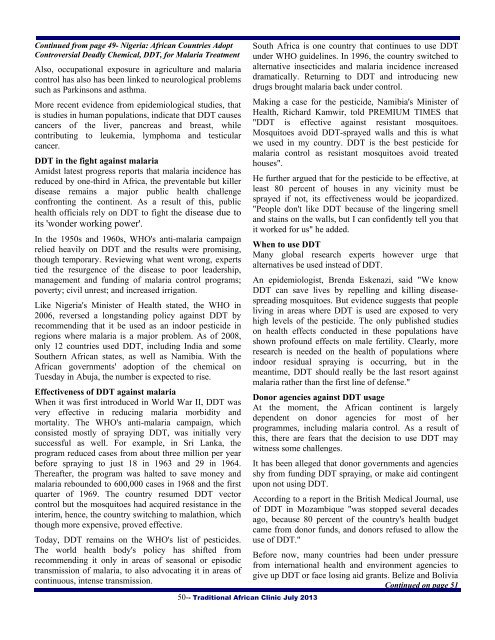toxicity - pesticides, herbicides and insecticides - Blackherbals.com
toxicity - pesticides, herbicides and insecticides - Blackherbals.com
toxicity - pesticides, herbicides and insecticides - Blackherbals.com
You also want an ePaper? Increase the reach of your titles
YUMPU automatically turns print PDFs into web optimized ePapers that Google loves.
Continued from page 49- Nigeria: African Countries AdoptControversial Deadly Chemical, DDT, for Malaria TreatmentAlso, occupational exposure in agriculture <strong>and</strong> malariacontrol has also has been linked to neurological problemssuch as Parkinsons <strong>and</strong> asthma.More recent evidence from epidemiological studies, thatis studies in human populations, indicate that DDT causescancers of the liver, pancreas <strong>and</strong> breast, whilecontributing to leukemia, lymphoma <strong>and</strong> testicularcancer.DDT in the fight against malariaAmidst latest progress reports that malaria incidence hasreduced by one-third in Africa, the preventable but killerdisease remains a major public health challengeconfronting the continent. As a result of this, publichealth officials rely on DDT to fight the disease due toits 'wonder working power'.In the 1950s <strong>and</strong> 1960s, WHO's anti-malaria campaignrelied heavily on DDT <strong>and</strong> the results were promising,though temporary. Reviewing what went wrong, expertstied the resurgence of the disease to poor leadership,management <strong>and</strong> funding of malaria control programs;poverty; civil unrest; <strong>and</strong> increased irrigation.Like Nigeria's Minister of Health stated, the WHO in2006, reversed a longst<strong>and</strong>ing policy against DDT byre<strong>com</strong>mending that it be used as an indoor pesticide inregions where malaria is a major problem. As of 2008,only 12 countries used DDT, including India <strong>and</strong> someSouthern African states, as well as Namibia. With theAfrican governments' adoption of the chemical onTuesday in Abuja, the number is expected to rise.Effectiveness of DDT against malariaWhen it was first introduced in World War II, DDT wasvery effective in reducing malaria morbidity <strong>and</strong>mortality. The WHO's anti-malaria campaign, whichconsisted mostly of spraying DDT, was initially verysuccessful as well. For example, in Sri Lanka, theprogram reduced cases from about three million per yearbefore spraying to just 18 in 1963 <strong>and</strong> 29 in 1964.Thereafter, the program was halted to save money <strong>and</strong>malaria rebounded to 600,000 cases in 1968 <strong>and</strong> the firstquarter of 1969. The country resumed DDT vectorcontrol but the mosquitoes had acquired resistance in theinterim, hence, the country switching to malathion, whichthough more expensive, proved effective.Today, DDT remains on the WHO's list of <strong>pesticides</strong>.The world health body's policy has shifted fromre<strong>com</strong>mending it only in areas of seasonal or episodictransmission of malaria, to also advocating it in areas ofcontinuous, intense transmission.50-- Traditional African Clinic July 2013South Africa is one country that continues to use DDTunder WHO guidelines. In 1996, the country switched toalternative <strong>insecticides</strong> <strong>and</strong> malaria incidence increaseddramatically. Returning to DDT <strong>and</strong> introducing newdrugs brought malaria back under control.Making a case for the pesticide, Namibia's Minister ofHealth, Richard Kamwir, told PREMIUM TIMES that"DDT is effective against resistant mosquitoes.Mosquitoes avoid DDT-sprayed walls <strong>and</strong> this is whatwe used in my country. DDT is the best pesticide formalaria control as resistant mosquitoes avoid treatedhouses".He further argued that for the pesticide to be effective, atleast 80 percent of houses in any vicinity must besprayed if not, its effectiveness would be jeopardized."People don't like DDT because of the lingering smell<strong>and</strong> stains on the walls, but I can confidently tell you thatit worked for us" he added.When to use DDTMany global research experts however urge thatalternatives be used instead of DDT.An epidemiologist, Brenda Eskenazi, said "We knowDDT can save lives by repelling <strong>and</strong> killing diseasespreadingmosquitoes. But evidence suggests that peopleliving in areas where DDT is used are exposed to veryhigh levels of the pesticide. The only published studieson health effects conducted in these populations haveshown profound effects on male fertility. Clearly, moreresearch is needed on the health of populations whereindoor residual spraying is occurring, but in themeantime, DDT should really be the last resort againstmalaria rather than the first line of defense."Donor agencies against DDT usageAt the moment, the African continent is largelydependent on donor agencies for most of herprogrammes, including malaria control. As a result ofthis, there are fears that the decision to use DDT maywitness some challenges.It has been alleged that donor governments <strong>and</strong> agenciesshy from funding DDT spraying, or make aid contingentupon not using DDT.According to a report in the British Medical Journal, useof DDT in Mozambique "was stopped several decadesago, because 80 percent of the country's health budgetcame from donor funds, <strong>and</strong> donors refused to allow theuse of DDT."Before now, many countries had been under pressurefrom international health <strong>and</strong> environment agencies togive up DDT or face losing aid grants. Belize <strong>and</strong> BoliviaContinued on page 51
















